First Mi’kmaw senator Dan Christmas retires from the Red Chamber
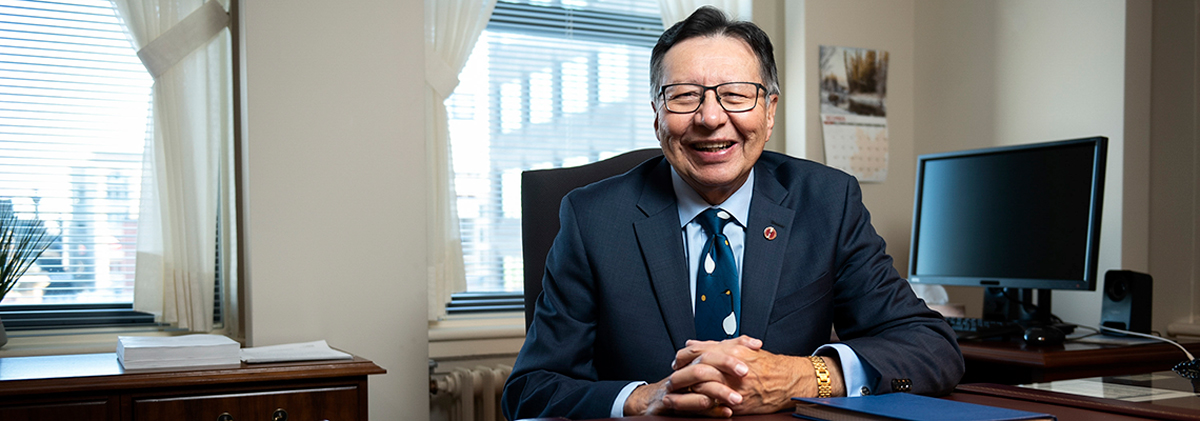
Senator Dan Christmas came into politics by accident when he was just 19 years old. Almost 45 years later, the senator from Membertou, Nova Scotia, has led a remarkable political career. He helped transform Membertou into one of the most prosperous First Nations in Canada and he became the first Mi’kmaw appointed to the Red Chamber.
In this interview ahead of his January 31, 2023 retirement, Senator Christmas shares his memorable moments in the Senate and why he’s leaving early.
How did you get involved in politics at such an early age and what motivated you to keep going?
I was a second-year university student when my father suddenly passed away. I wanted to continue my studies, but I had five younger siblings and we needed another income in the family. A position opened here in Membertou as a band manager for the community, so I applied. I wasn’t looking for the position; it just happened. But once I got involved, I enjoyed making a difference for the community, helping people and getting things done. That was some 45 years ago, and the same things still motivate me.
You have often spoken highly of your father, Augustus Christmas. How did he shape your upbringing?
My father was an underdog. He was disabled from his experiences in the Second World War, so he wore a back brace and a leg brace. But he was ingenious in finding ways to make an income for his family. He was a taxi driver, he cut wood, he gardened and he did small jobs. He was always active. It was only later in life that I realized he was disabled. He never said a word about it.
He had so much pride in taking care of his family. He was very kind, very funny at times, hardworking, but more than anything else, he cared for his family. He showed me by example how to grow up as a Mi’kmaw man. Even though he passed away when I was only 19 years old, he left a huge imprint on me.
Your grandfather was also an influential community leader. As the Chief of Membertou, Ben Christmas successfully fought against the federal government’s plan to centralize Mi’kmaw communities in the 1940s. How has his work inspired you?
My dad didn’t want me to get into politics. But I think my grandfather would have been extremely proud that I got to sit in the Red Chamber. Apart from opposing centralization, he also advocated for changes to the Indian Act in the early 1950s. When that bill was being debated in Parliament, he appeared many times as a witness. He would arrive in Ottawa at the old train station, which is now the temporary home of the Senate. Walking through that building as a senator, I could almost feel his presence.
You were appointed to the Senate in 2016. What was it like getting that phone call from the prime minister?
We were celebrating my sister’s birthday at my mother’s house when my cellphone rang. The whole place was loud, so I went into the basement to answer it. It was Prime Minister Justin Trudeau calling to say he was going to recommend that I be appointed to the Senate. I couldn’t believe it. I forgot most of what he said after that, but the one thing I remember he said was ‘Dan, it’s very important that you do not say this to anyone else until after the announcement.’ I promised I wouldn’t.
I went back upstairs and told my wife. Then I was watching my mom at the kitchen table with the rest of the family, and I thought I should at least tell her. My mom is deaf in one ear, so I whispered in her good ear that the prime minister had asked me to become a senator. She had this puzzled look on her face, and I knew she didn’t hear me, so I said it again a little louder. When I repeated it again, the table went quiet. My mom still couldn’t hear me, but everyone else started jumping up and down. As I was leaving the house, I remembered the prime minister’s request to keep the news secret, but by that time it was too late — it was already on Facebook. I was worried that I was going to get disqualified.
The day of my appointment will always live forever in my mind.
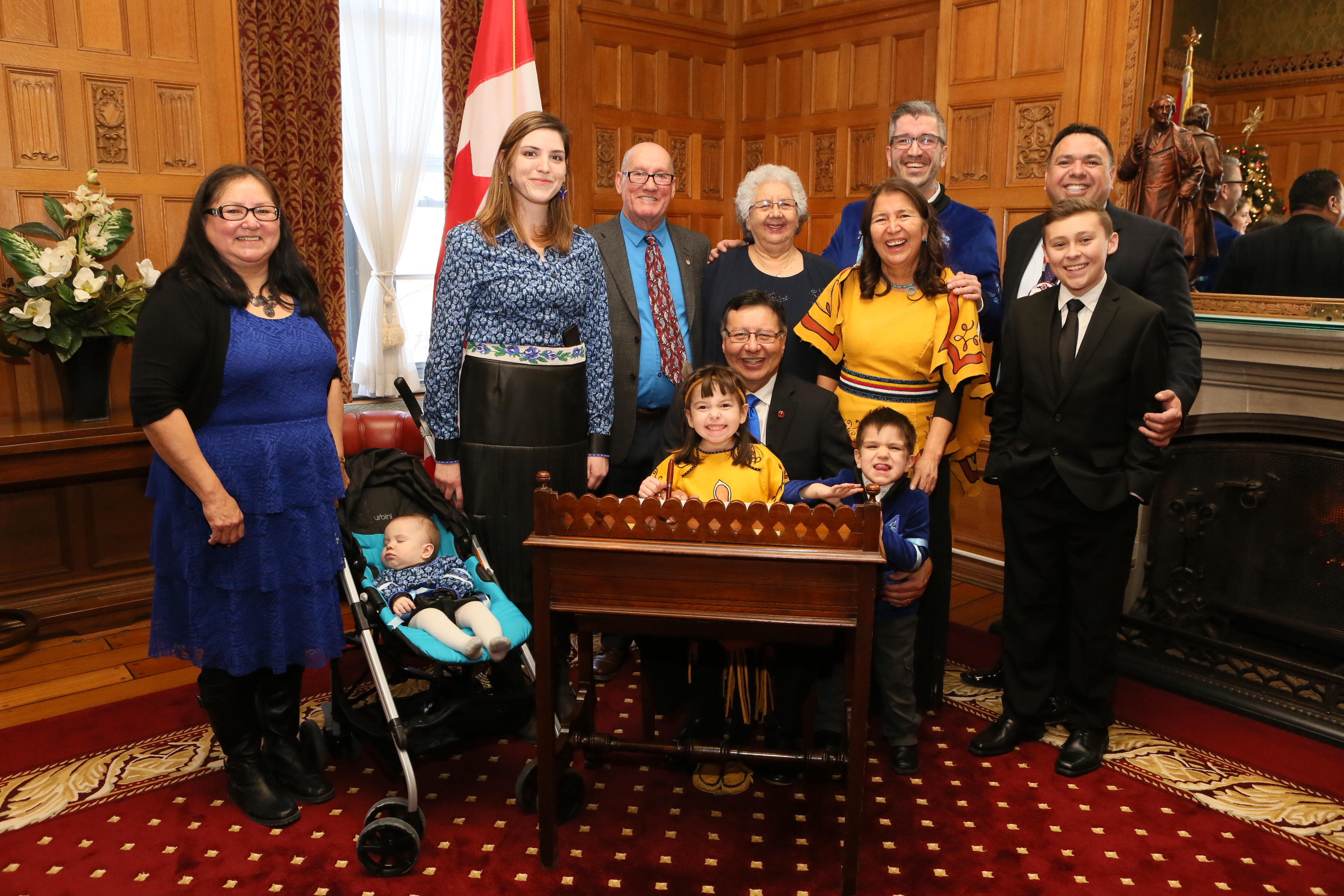
Senator Dan Christmas is surrounded by his family and friends during his Senate swearing-in ceremony in December 2016.
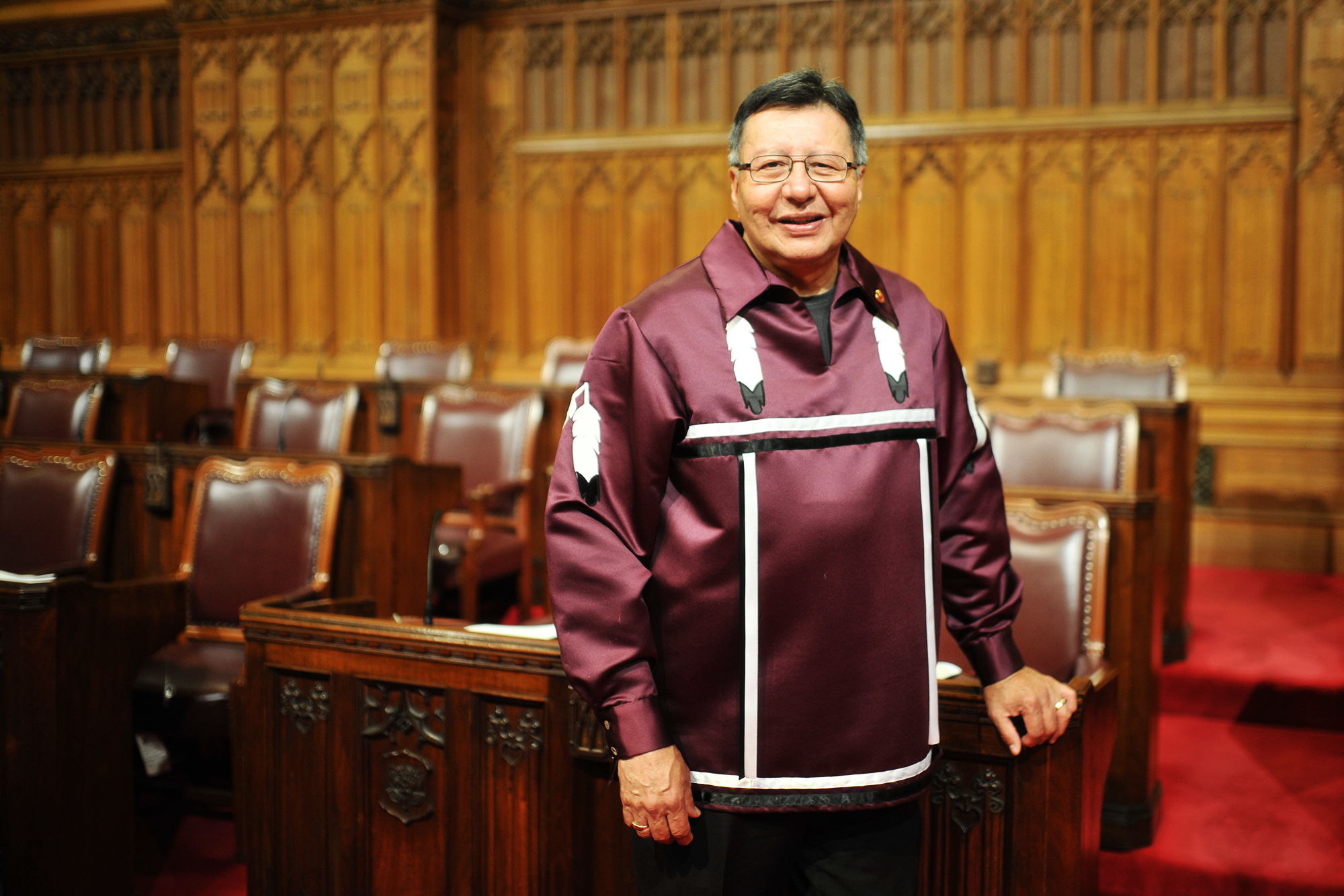 Senator Christmas made history as the first Mi’kmaw appointed to the Red Chamber. He’s shown here in Centre Block on National Indigenous Peoples Day on June 21, 2017, little more than a week before Canada’s 150th birthday.
Senator Christmas made history as the first Mi’kmaw appointed to the Red Chamber. He’s shown here in Centre Block on National Indigenous Peoples Day on June 21, 2017, little more than a week before Canada’s 150th birthday.
What did it mean to you to be named the first Mi’kmaw senator?
I found it so profound. I was appointed in October 2016, months before Canada’s 150th anniversary. For the first time in 150 years, a Mi’kmaw voice was able to partake in Parliament. That moment never left my mind, that this was reconciliation happening in real time and I was part of it.
You took the unusual step of opening a Senate office in your community. What lead to this decision?
It seemed very natural to me because throughout my career as a politician, I always had to be available. As a politician, you must have an open door.
I had some backlash from other parliamentarians, mostly those in the House of Commons, because they felt I was stepping on MPs’ toes. They thought that because MPs are elected, they should be responsible for meeting with the public and addressing their concerns, not senators. I said, “How many Mi’kmaw senators are there? How many Mi’kmaw MPs? Who’s going to represent our people?”
Senators are there to represent minorities and those who don’t have a voice. I never heard any good answers to my questions, so I carried on.
What legislative or committee work are you most proud of?
During my six years, I was fortunate to serve on two committees: Indigenous Peoples and Fisheries and Oceans. Indigenous Peoples was my favourite committee. I knew the issues inside out and I loved learning about other Indigenous communities. I have come to appreciate the amazing diversity of Indigenous people in this country, their cultures, their languages, their histories, their backgrounds, their ways of life and their contributions.
The high point for me was the passing of Bill C-15, the United Nations Declaration on the Rights of Indigenous Peoples Act. I was the chair of the Indigenous Peoples committee at the time, and we were in the middle of the pandemic. That was my Mount Everest in life. I never worked so hard as committee chair than I did trying to get C-15 passed.
You served in Centre Block before it closed for rehabilitation in 2019. Do you have any fond memories from your time working in the building?
Filmmaker Alanis Obomsawin filmed my daughter Gail and me reading a children’s book on a bench in front of the Senate Chamber’s permanent home. The clip made it into Alanis’s documentary, Jordan River Anderson, The Messenger. That was my most memorable moment in Centre Block.
You had another eight years until your mandatory retirement date. What made you decide to leave the Senate early?
My wife Dozay passed away about three years ago and I was planning to retire then. We had adopted Gail, who has a disability, and she was nine at the time. A good friend suggested I wait a few months before retiring. In those months, the pandemic happened. The Senate switched to hybrid sittings which enabled me to stay home and do my work as a senator. I knew we would eventually return to in-person sittings, and then I would need to resign.
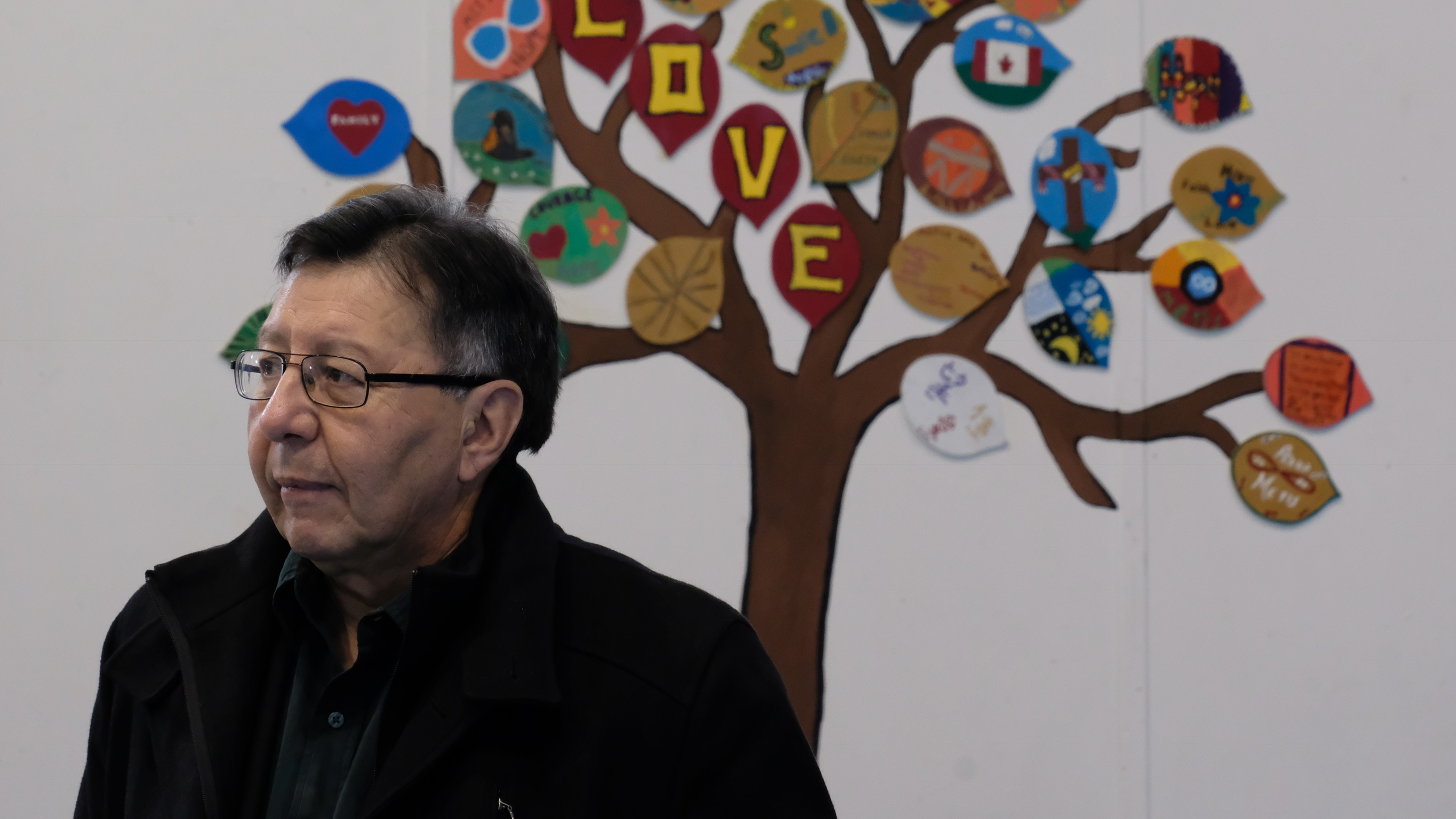 Senator Christmas stands in front of a piece of local art displayed in the recreation centre at Buffalo Lake, Alberta, where members of the Senate Committee on Indigenous Peoples met with community members during a fact-finding mission in 2018.
Senator Christmas stands in front of a piece of local art displayed in the recreation centre at Buffalo Lake, Alberta, where members of the Senate Committee on Indigenous Peoples met with community members during a fact-finding mission in 2018.
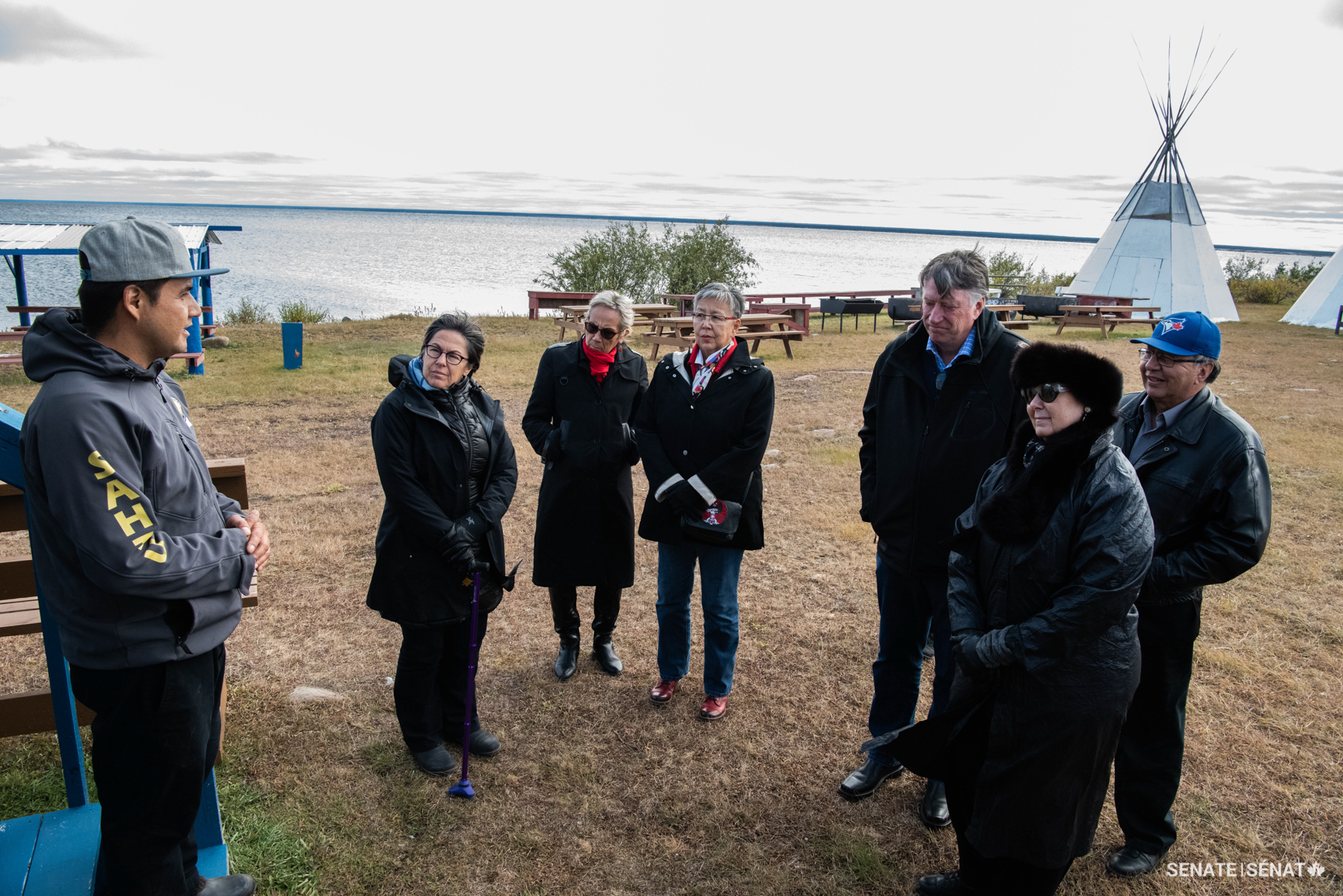 From left, senators Kim Pate and Mary Jane McCallum, former senator Lillian Eva Dyck and senators Scott Tannas, Marilou McPhedran and Dan Christmas, tour Délįne, Northwest Territories during a fact-finding mission with the Senate Committee on Indigenous Peoples (then named the Senate Committee on Aboriginal Peoples) in 2018.
From left, senators Kim Pate and Mary Jane McCallum, former senator Lillian Eva Dyck and senators Scott Tannas, Marilou McPhedran and Dan Christmas, tour Délįne, Northwest Territories during a fact-finding mission with the Senate Committee on Indigenous Peoples (then named the Senate Committee on Aboriginal Peoples) in 2018.
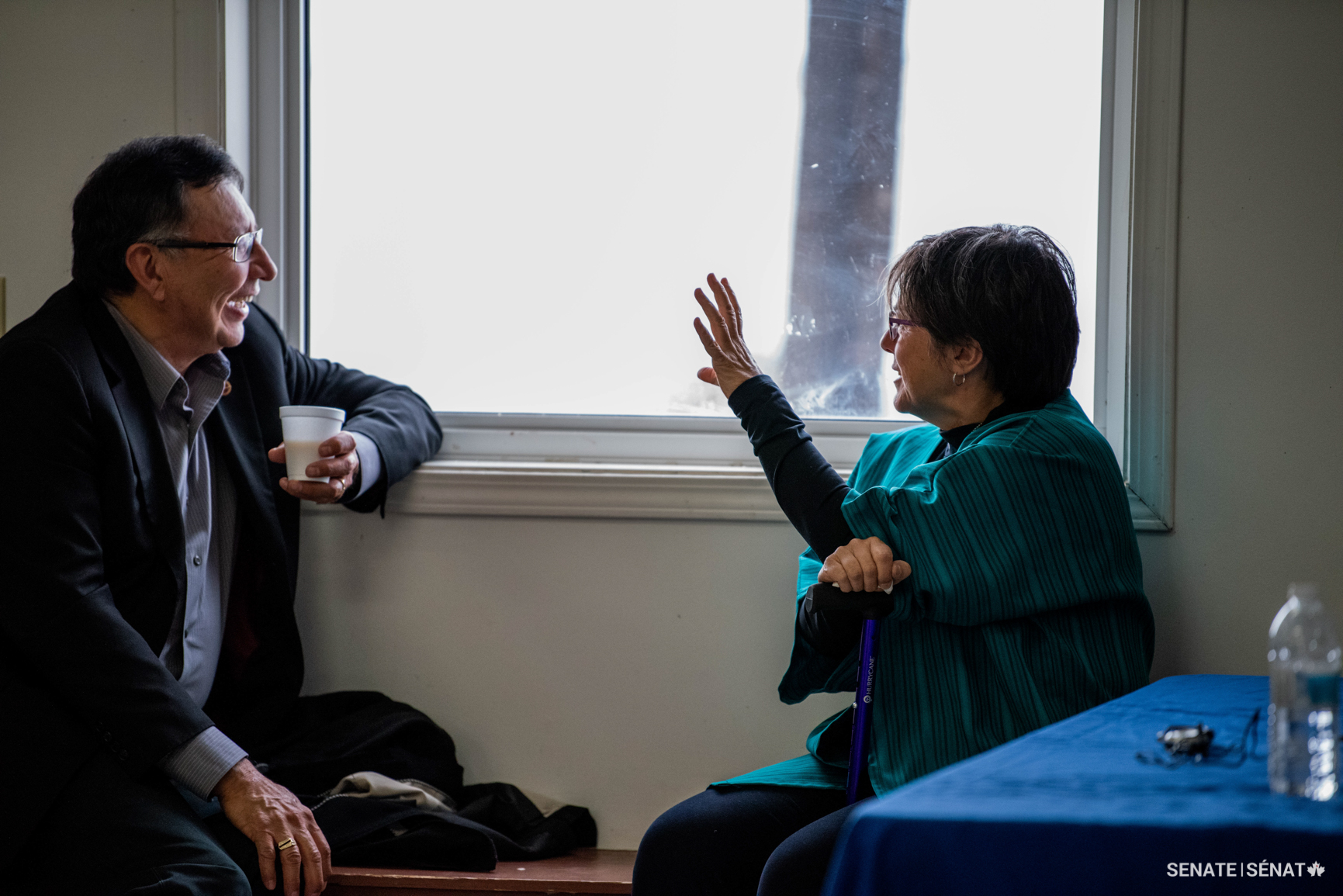 Senator Christmas shares a laugh with Senator Pate near Great Bear Lake in Délįne in 2018.
Senator Christmas shares a laugh with Senator Pate near Great Bear Lake in Délįne in 2018.
 Senator Christmas, his daughter Gail and her Teacup Maltese named Wastow visit the Louisbourg Lighthouse to check out the shoreline damage after Hurricane Fiona swept through Cape Breton in late September 2022. (Photo credit: Senator Dan Christmas)
Senator Christmas, his daughter Gail and her Teacup Maltese named Wastow visit the Louisbourg Lighthouse to check out the shoreline damage after Hurricane Fiona swept through Cape Breton in late September 2022. (Photo credit: Senator Dan Christmas)
I think I have done my piece in the Senate. Apart from Bill C-15, the Fisheries and Oceans report on moderate livelihood fisheries was a milestone for me. And the Indigenous Peoples report on Bill S-3, the gender equity issue within the Indian Act. I spent a lot of blood and tears on that as well.
But at this stage of my life, my priority is looking out for my beautiful little girl. As I told my Senate colleagues, don’t think that staying home and being a single parent is a grief for me. It isn’t. I love it. It gives me so much purpose and I enjoy being a dad perhaps the same way that my dad enjoyed being a dad to me.
Note to readers: The Honourable Daniel Christmas retired from the Senate of Canada in January 2023. Visit the Library of Parliament's Parlinfo website to learn more about his work in Parliament.
Related articles
Tags
Committee news
First Mi’kmaw senator Dan Christmas retires from the Red Chamber

Senator Dan Christmas came into politics by accident when he was just 19 years old. Almost 45 years later, the senator from Membertou, Nova Scotia, has led a remarkable political career. He helped transform Membertou into one of the most prosperous First Nations in Canada and he became the first Mi’kmaw appointed to the Red Chamber.
In this interview ahead of his January 31, 2023 retirement, Senator Christmas shares his memorable moments in the Senate and why he’s leaving early.
How did you get involved in politics at such an early age and what motivated you to keep going?
I was a second-year university student when my father suddenly passed away. I wanted to continue my studies, but I had five younger siblings and we needed another income in the family. A position opened here in Membertou as a band manager for the community, so I applied. I wasn’t looking for the position; it just happened. But once I got involved, I enjoyed making a difference for the community, helping people and getting things done. That was some 45 years ago, and the same things still motivate me.
You have often spoken highly of your father, Augustus Christmas. How did he shape your upbringing?
My father was an underdog. He was disabled from his experiences in the Second World War, so he wore a back brace and a leg brace. But he was ingenious in finding ways to make an income for his family. He was a taxi driver, he cut wood, he gardened and he did small jobs. He was always active. It was only later in life that I realized he was disabled. He never said a word about it.
He had so much pride in taking care of his family. He was very kind, very funny at times, hardworking, but more than anything else, he cared for his family. He showed me by example how to grow up as a Mi’kmaw man. Even though he passed away when I was only 19 years old, he left a huge imprint on me.
Your grandfather was also an influential community leader. As the Chief of Membertou, Ben Christmas successfully fought against the federal government’s plan to centralize Mi’kmaw communities in the 1940s. How has his work inspired you?
My dad didn’t want me to get into politics. But I think my grandfather would have been extremely proud that I got to sit in the Red Chamber. Apart from opposing centralization, he also advocated for changes to the Indian Act in the early 1950s. When that bill was being debated in Parliament, he appeared many times as a witness. He would arrive in Ottawa at the old train station, which is now the temporary home of the Senate. Walking through that building as a senator, I could almost feel his presence.
You were appointed to the Senate in 2016. What was it like getting that phone call from the prime minister?
We were celebrating my sister’s birthday at my mother’s house when my cellphone rang. The whole place was loud, so I went into the basement to answer it. It was Prime Minister Justin Trudeau calling to say he was going to recommend that I be appointed to the Senate. I couldn’t believe it. I forgot most of what he said after that, but the one thing I remember he said was ‘Dan, it’s very important that you do not say this to anyone else until after the announcement.’ I promised I wouldn’t.
I went back upstairs and told my wife. Then I was watching my mom at the kitchen table with the rest of the family, and I thought I should at least tell her. My mom is deaf in one ear, so I whispered in her good ear that the prime minister had asked me to become a senator. She had this puzzled look on her face, and I knew she didn’t hear me, so I said it again a little louder. When I repeated it again, the table went quiet. My mom still couldn’t hear me, but everyone else started jumping up and down. As I was leaving the house, I remembered the prime minister’s request to keep the news secret, but by that time it was too late — it was already on Facebook. I was worried that I was going to get disqualified.
The day of my appointment will always live forever in my mind.

Senator Dan Christmas is surrounded by his family and friends during his Senate swearing-in ceremony in December 2016.
 Senator Christmas made history as the first Mi’kmaw appointed to the Red Chamber. He’s shown here in Centre Block on National Indigenous Peoples Day on June 21, 2017, little more than a week before Canada’s 150th birthday.
Senator Christmas made history as the first Mi’kmaw appointed to the Red Chamber. He’s shown here in Centre Block on National Indigenous Peoples Day on June 21, 2017, little more than a week before Canada’s 150th birthday.
What did it mean to you to be named the first Mi’kmaw senator?
I found it so profound. I was appointed in October 2016, months before Canada’s 150th anniversary. For the first time in 150 years, a Mi’kmaw voice was able to partake in Parliament. That moment never left my mind, that this was reconciliation happening in real time and I was part of it.
You took the unusual step of opening a Senate office in your community. What lead to this decision?
It seemed very natural to me because throughout my career as a politician, I always had to be available. As a politician, you must have an open door.
I had some backlash from other parliamentarians, mostly those in the House of Commons, because they felt I was stepping on MPs’ toes. They thought that because MPs are elected, they should be responsible for meeting with the public and addressing their concerns, not senators. I said, “How many Mi’kmaw senators are there? How many Mi’kmaw MPs? Who’s going to represent our people?”
Senators are there to represent minorities and those who don’t have a voice. I never heard any good answers to my questions, so I carried on.
What legislative or committee work are you most proud of?
During my six years, I was fortunate to serve on two committees: Indigenous Peoples and Fisheries and Oceans. Indigenous Peoples was my favourite committee. I knew the issues inside out and I loved learning about other Indigenous communities. I have come to appreciate the amazing diversity of Indigenous people in this country, their cultures, their languages, their histories, their backgrounds, their ways of life and their contributions.
The high point for me was the passing of Bill C-15, the United Nations Declaration on the Rights of Indigenous Peoples Act. I was the chair of the Indigenous Peoples committee at the time, and we were in the middle of the pandemic. That was my Mount Everest in life. I never worked so hard as committee chair than I did trying to get C-15 passed.
You served in Centre Block before it closed for rehabilitation in 2019. Do you have any fond memories from your time working in the building?
Filmmaker Alanis Obomsawin filmed my daughter Gail and me reading a children’s book on a bench in front of the Senate Chamber’s permanent home. The clip made it into Alanis’s documentary, Jordan River Anderson, The Messenger. That was my most memorable moment in Centre Block.
You had another eight years until your mandatory retirement date. What made you decide to leave the Senate early?
My wife Dozay passed away about three years ago and I was planning to retire then. We had adopted Gail, who has a disability, and she was nine at the time. A good friend suggested I wait a few months before retiring. In those months, the pandemic happened. The Senate switched to hybrid sittings which enabled me to stay home and do my work as a senator. I knew we would eventually return to in-person sittings, and then I would need to resign.
 Senator Christmas stands in front of a piece of local art displayed in the recreation centre at Buffalo Lake, Alberta, where members of the Senate Committee on Indigenous Peoples met with community members during a fact-finding mission in 2018.
Senator Christmas stands in front of a piece of local art displayed in the recreation centre at Buffalo Lake, Alberta, where members of the Senate Committee on Indigenous Peoples met with community members during a fact-finding mission in 2018.
 From left, senators Kim Pate and Mary Jane McCallum, former senator Lillian Eva Dyck and senators Scott Tannas, Marilou McPhedran and Dan Christmas, tour Délįne, Northwest Territories during a fact-finding mission with the Senate Committee on Indigenous Peoples (then named the Senate Committee on Aboriginal Peoples) in 2018.
From left, senators Kim Pate and Mary Jane McCallum, former senator Lillian Eva Dyck and senators Scott Tannas, Marilou McPhedran and Dan Christmas, tour Délįne, Northwest Territories during a fact-finding mission with the Senate Committee on Indigenous Peoples (then named the Senate Committee on Aboriginal Peoples) in 2018.
 Senator Christmas shares a laugh with Senator Pate near Great Bear Lake in Délįne in 2018.
Senator Christmas shares a laugh with Senator Pate near Great Bear Lake in Délįne in 2018.
 Senator Christmas, his daughter Gail and her Teacup Maltese named Wastow visit the Louisbourg Lighthouse to check out the shoreline damage after Hurricane Fiona swept through Cape Breton in late September 2022. (Photo credit: Senator Dan Christmas)
Senator Christmas, his daughter Gail and her Teacup Maltese named Wastow visit the Louisbourg Lighthouse to check out the shoreline damage after Hurricane Fiona swept through Cape Breton in late September 2022. (Photo credit: Senator Dan Christmas)
I think I have done my piece in the Senate. Apart from Bill C-15, the Fisheries and Oceans report on moderate livelihood fisheries was a milestone for me. And the Indigenous Peoples report on Bill S-3, the gender equity issue within the Indian Act. I spent a lot of blood and tears on that as well.
But at this stage of my life, my priority is looking out for my beautiful little girl. As I told my Senate colleagues, don’t think that staying home and being a single parent is a grief for me. It isn’t. I love it. It gives me so much purpose and I enjoy being a dad perhaps the same way that my dad enjoyed being a dad to me.
Note to readers: The Honourable Daniel Christmas retired from the Senate of Canada in January 2023. Visit the Library of Parliament's Parlinfo website to learn more about his work in Parliament.


